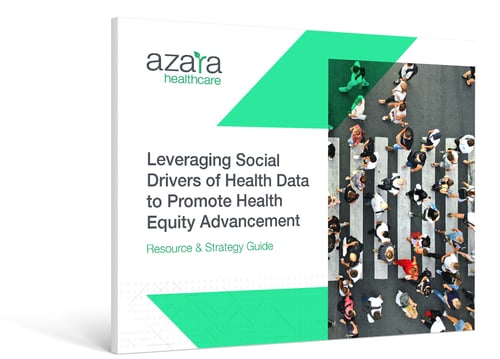Resource guide outlines necessary steps to act on national health equity initiatives by addressing SDOH needs and disparities
Azara Healthcare, the leading provider of population health management solutions, has announced the release of a newly available resource and strategy guide – Leveraging Social Drivers of Health Data to Promote Health Equity Advancement.
 When considering what is driving national health disparities, it is important to look closely at the role various factors play. Social Drivers of Health (SDOH) is a comprehensive term that addresses the policies, systems and structures that fuel inequities in areas that influence a person’s health – such as health care, housing, and access to healthy food and transportation.
When considering what is driving national health disparities, it is important to look closely at the role various factors play. Social Drivers of Health (SDOH) is a comprehensive term that addresses the policies, systems and structures that fuel inequities in areas that influence a person’s health – such as health care, housing, and access to healthy food and transportation.
“SDOH data are a critical component of any health equity advancement strategy, and the aim of our new resource guide is to help establish a data-driven process to uncover the factors that affect patient health, as well as personal characteristics that cannot be changed,” said Jeff Brandes, President and CEO, Azara Healthcare. “By learning how to effectively utilize actionable data, organizations will be better positioned to meet population health goals, reduce costs and improve outcomes for all patients.”
In 2022, the U.S. Department of Health and Human Services (HHS) adopted a strategic approach to address SDOH and guide efforts to make health outcomes more equitable by addressing the underlying systemic and environmental factors that affect health. It is estimated that clinical care accounts for only 20% of health outcome variation, while SDOH account for as much as 50% and are a major driver of health disparities.
The new report outlines three key steps to help move the needle on health equity initiatives:
- Pinpoint where the greatest needs exist across a population.
- Take action on identified social and medical needs to drive change.
- Use data to evaluate impact and measure progress.
“The first step toward advancing health equity initiatives is to assess where efforts are needed most. Once areas of greatest need are identified, organizations can then begin to engage patients and this is when gaps in care are reduced, cost savings are achieved and patients can realize their full health potential,” said Brandes.
Access the complete guide to learn how analyzing and integrating SDOH data can serve as a foundation for health equity advancement across the healthcare industry. Visit azarahealthcare.com for more information.
About Azara Healthcare
Azara Healthcare, the 2023 Best in KLAS provider of population health management solutions, is the leading provider of quality measurement, analytics and reporting for the Community Health and physician practice market. Azara solutions empower more than 1,000 Community Health Centers, physician practices, Primary Care Associations, Health Center Controlled Networks, and clinically integrated networks in 40 states to improve the quality and efficiency of care for more than 25 million Americans through actionable data. www.azarahealthcare.com
Related Articles

Azara Healthcare Names Eugene Wong Chief Financial Officer
Explore Insights
Azara Healthcare Releases New Risk Adjustment Capabilities in EHR Plug-In for athenaOne via the athenahealth Marketplace
Explore Insights
